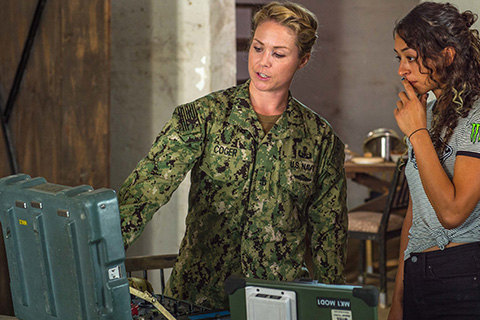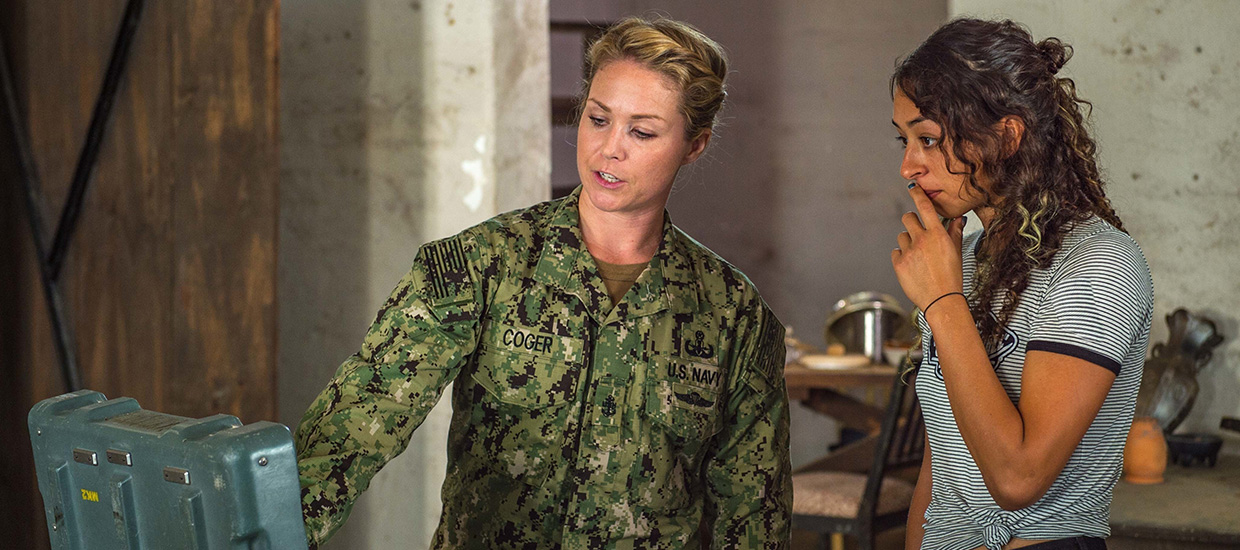University of Miami alumni graduate from college and go off to do new and exciting things. Some become brilliant researchers, writers, engineers or lawyers. Few, however, can say they’ve taken the path that alumna Brianne “Brie” Coger took just two years after graduation. She enlisted in the United States Navy in 2007 and is currently a Chief Petty Officer and one of only 12 female enlisted EOD (Explosive Ordnance Disposal) technicians in the Navy.
What does a Navy EOD tech do? They’re trained to disarm and neutralize all types of ordnance, including bombs, mines, improvised explosive devices (IEDs), chemical and nuclear weapons. EOD techs, like Coger, work on land and underwater and may be called to work with all branches of the military. They also support civilian law enforcement agencies and the Secret Service.
In her current assignment, Coger serves as a Mine Countermeasures (MCM) course supervisor, where she is currently revising the curriculum to reflect the latest MCM structure and tactics. She also serves collateral roles as a military instructor and program coordinator.
She graduated from UM with a degree in Theater and spent two years “trying to do the acting thing” in New York, before getting an email from the Army. She says, “The email said ‘join the Army and make money and do cool stuff’ and I thought, ‘I want to do cool stuff! And I could serve my country too, which is super neat!’ But I wanted to do something in the water – so I called the Navy instead."
Coger told the Navy recruiter she wanted to do 'cool stuff', and he pointed her to the Navy’s Special Warfare program, which includes the Navy SEALs, Navy Divers, Rescue Swimmers, and Explosive Ordinance Disposal (EOD) units. With its challenging combination of technical knowledge and physical demands, the EOD program stood out to her.
Never one to shy away from a challenge, she was active on her high school swim team and still holds some school swimming records. She competed in synchronized swimming competitions across the country and worked as a swimming instructor for kids during her time at UM.
Navy EOD techs like Coger are the world’s ultimate bomb squad. They perform some of the most harrowing, dangerous work in order to keep others from harm’s way, and they do so in every environment. That may sound intimidating to most people, but for Coger it was a selling point.
“What I love about EOD is that there is no typical day; that's part of why 10 years has flown by so quickly for me,” she said. “Whether we're going out to do some diving and an underwater detonation, or we have to go to a remote location in the mountains to do some IED training, or just working a chemical or biological problem in a laboratory situation – there’s nothing typical about any of that, and that's exactly what I needed in my life.”
While Coger may be one of just 12 female enlisted EOD techs in the Navy, she says she’s never felt that her gender was an issue in her Navy career. In fact, Coger has enjoyed tremendous success in a relatively short time, rising to chief petty officer – a senior enlisted rate – in just eight years. “People think that joining the military means giving up things, but I’ve never seen it like that,” she said. “When you decide to enlist you aren’t losing something; you are gaining opportunities. The biggest thing that has helped me in my career is saying yes; embracing whatever's out there and keeping my eyes and ears open to what’s possible.”
When she started, Coger, like every recruit, still had to adjust to military life and the new expectations and responsibilities that come with enlistment. Her decision to go for a job in the Special Warfare community added to the challenge, with specialized physical and mental training beginning before boot camp and extending well into the first year of enlistment. Coger credits her instructors for challenging, encouraging and motivating her to succeed.
“My instructors were incredible. They had done the job, and knew what it took to accomplish the missions, and they supported me and bent over backwards to make sure I knew what it would take to succeed,” she said. “Over the past ten years I’ve tried to show them a return on the investment they made in me; that their hard work was well-received and appreciated. “So for prospective female recruits I’d say this: Whatever your passion is – whatever job you want to do, or mission you are tasked with accomplishing – you will be supported and mentored and motivated in the Navy, because everyone is invested in your success.”





